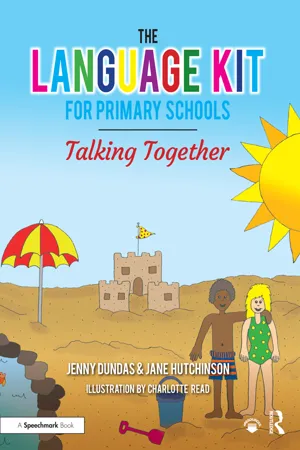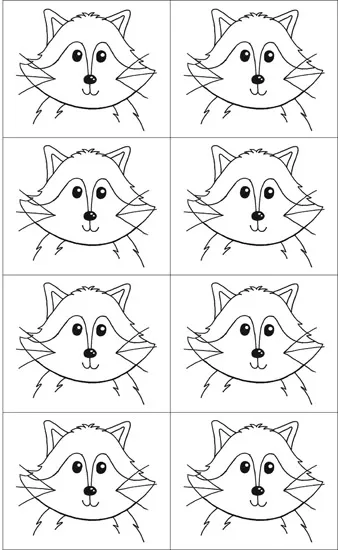
- 196 pages
- English
- ePUB (mobile friendly)
- Available on iOS & Android
eBook - ePub
About this book
The Language Kit for Primary Schools is a comprehensive toolkit for teachers, SENCOs and teaching assistants who deliver group interventions in order to support language and communication in schools. Key features of the kit include: suggested strategies with clear guidelines to help practitioners to support spoken language difficulties; detailed instructions describing how to run and deliver language groups to maximize effectiveness; and, two intervention programmes including session plans, structured activities and photocopiable handouts, ensuring that everything necessary to run the group is in one place. Programmes are: a ten week programme for use with Key Stage 1 pupils. This may also be used with Foundation Stage children; a ten week programme for use with Key Stage 2 pupils. This may also be used with Key Stage 3 students; suggestions for simplifying or extending every activity, enabling the practitioner to differentiate and meet the needs of everyone in the group; an additional resource bank and activity ideas to allow further development of language groups. Written in a clear and concise style by a Speech and Language Therapist and a Specialist teacher of Speech, Language and Communication, this resource will allow practitioners to give pupils the best possible language support.
Tools to learn more effectively

Saving Books

Keyword Search

Annotating Text

Listen to it instead
Information
Key Stage 1 Language Group Sessions
Key Stage 1 ~ Session 1 Ten language group session plans, each including the instructions and photocopiable resources for all activities
 | Introduction
|
 |
|
 | Close session
|
 |
| Equipment: Noise-making items (eg a set of keys, jingle bells, ocean drum, ball bearings in a tin drum, etc) |
Description:
|
| Notes: The purpose of this game is to demonstrate and label the act of listening. Many children, when asked to listen, do not fully understand what this entails. Teaching good listening skills and following it up with an activity that underlines the act of listening helps the child to develop this essential skill. |
 |
| Equipment: Laminated pictures of foxes, sticky tac |
Descriptio\n:
|
Easier…
Harder…
|
| Notes: This activity provides an opportunity to practise expressive language at the sentence level. Discourage the use of empty language, eg ‘It’s over there’ or ‘It’s on the thingy’. Also, encourage specific vocabulary and discourage the use of generalisations, eg if the picture is on a stool, expect the word ‘stool’ and not ‘chair’. Expect the child to give the answer in a full, complete sentence, eg Child: ‘on there’ LA: ‘The fox is on the computer screen.’ Avoid giving a word directly. A forced alternative may be used, eg ‘Is it a cupboard or a bookcase?’ |

Key Stage 1 ~ Session 2
 | Introduction
|
 |
|
 | Close session
|
Table of contents
- Cover
- Title
- Copyright
- Contents
- Introduction
- Strategies
- How to run and deliver language groups
- Key Stage 1: Language group sessions
- Key Stage 2: Language group sessions
- Visual timetable pictures
- Language Resource Bank
- Glossary and description of terms used in this guide
Frequently asked questions
Yes, you can cancel anytime from the Subscription tab in your account settings on the Perlego website. Your subscription will stay active until the end of your current billing period. Learn how to cancel your subscription
No, books cannot be downloaded as external files, such as PDFs, for use outside of Perlego. However, you can download books within the Perlego app for offline reading on mobile or tablet. Learn how to download books offline
Perlego offers two plans: Essential and Complete
- Essential is ideal for learners and professionals who enjoy exploring a wide range of subjects. Access the Essential Library with 800,000+ trusted titles and best-sellers across business, personal growth, and the humanities. Includes unlimited reading time and Standard Read Aloud voice.
- Complete: Perfect for advanced learners and researchers needing full, unrestricted access. Unlock 1.4M+ books across hundreds of subjects, including academic and specialized titles. The Complete Plan also includes advanced features like Premium Read Aloud and Research Assistant.
We are an online textbook subscription service, where you can get access to an entire online library for less than the price of a single book per month. With over 1 million books across 990+ topics, we’ve got you covered! Learn about our mission
Look out for the read-aloud symbol on your next book to see if you can listen to it. The read-aloud tool reads text aloud for you, highlighting the text as it is being read. You can pause it, speed it up and slow it down. Learn more about Read Aloud
Yes! You can use the Perlego app on both iOS and Android devices to read anytime, anywhere — even offline. Perfect for commutes or when you’re on the go.
Please note we cannot support devices running on iOS 13 and Android 7 or earlier. Learn more about using the app
Please note we cannot support devices running on iOS 13 and Android 7 or earlier. Learn more about using the app
Yes, you can access The Language Kit for Primary Schools by Jenny Dundas,Jane Hutchinson in PDF and/or ePUB format, as well as other popular books in Didattica & Didattica generale. We have over one million books available in our catalogue for you to explore.